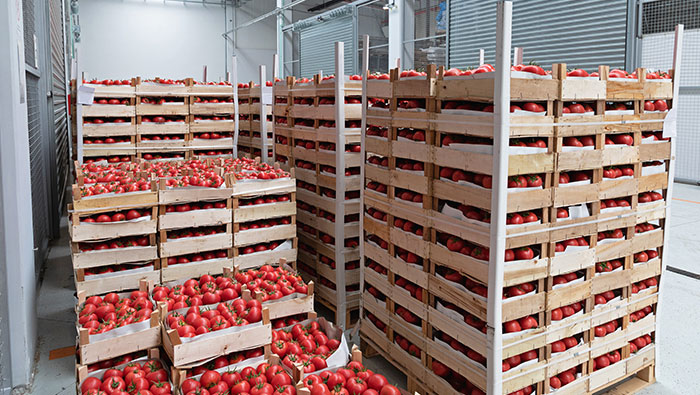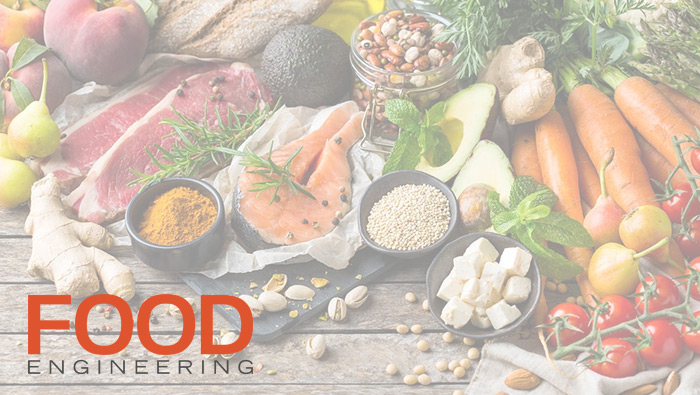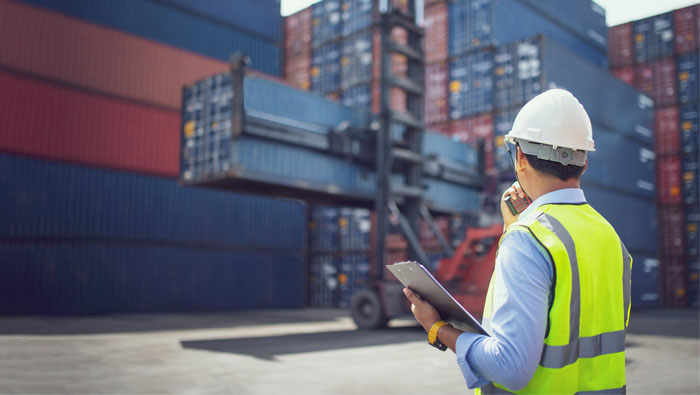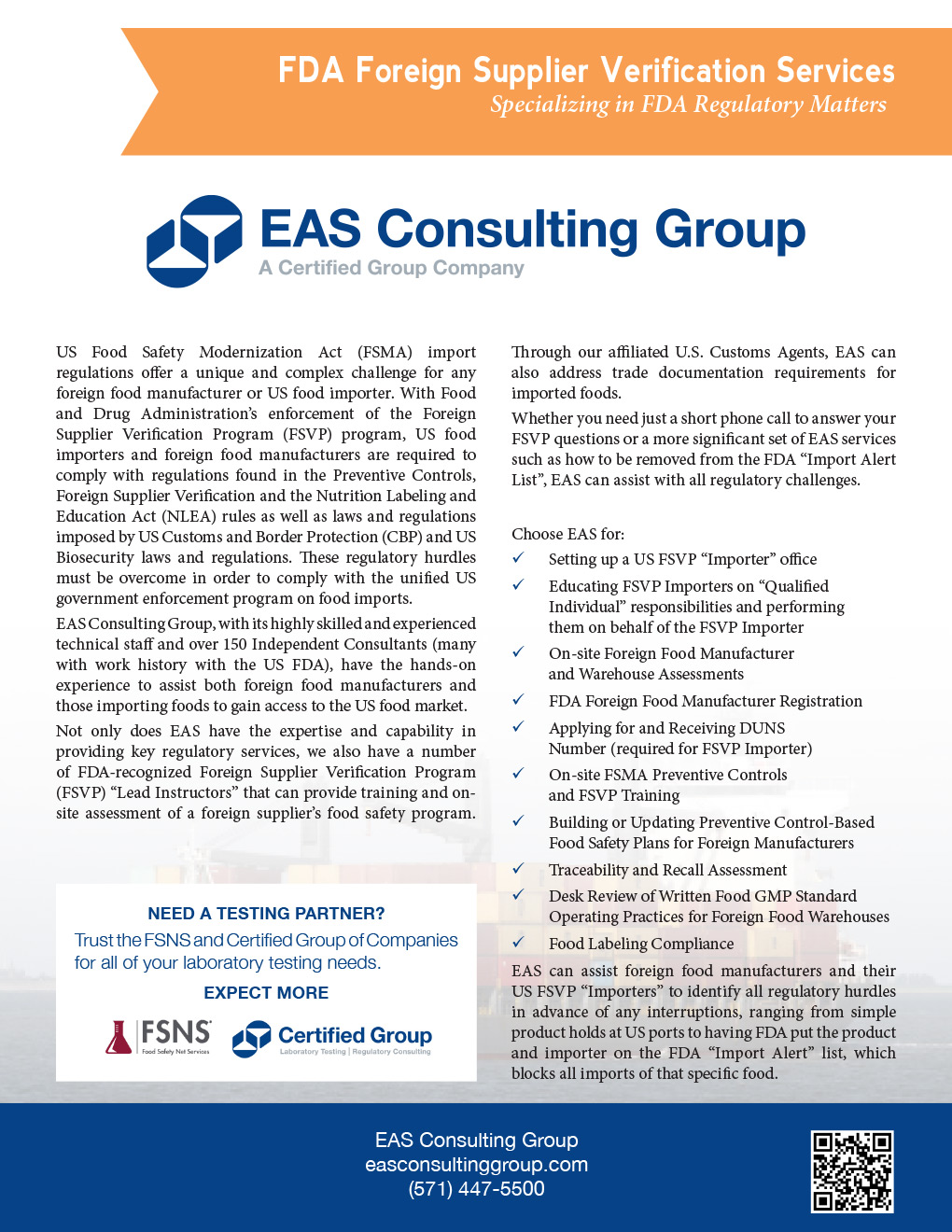How the Voluntary Qualified Importer Program (VQIP) Can Expedite Your US Imports

Most exporters of food products to the US are plagued by FDA import bottlenecks at the border. From paperwork to random and for-cause inspections, importing often feels like a waiting game. For everyone who has thought, Wouldn’t it be nice if FDA product imports could be expedited, this EAS Consulting Group, a Certified Group company, webinar discusses FDA’s “fast track” program for food imports called the Voluntary Qualified Importer Program (VQIP).
Presenter Bio: Domenic Veneziano, EAS Independent Advisor for imports, is the former director of FDA’s Division of Import Operations. …
Enter Your Information to Watch Now
By clicking submit above, you consent to allow EAS Consulting Group to store and process the personal information submitted above to provide you the content requested.
What is FDA’s Voluntary Qualified Importer Program (VQIP)?
Launched in 2018, FDA’s “fast track” program called VQIP enables approved FDA importers that export human and animal foods from a foreign supplier into the US to receive expedited review and entry of their products based on documented safety records and an unblemished history of imports. It’s a pay-to-play program with annual user fees attached.
The technical application requirements to achieve VQIP status can be arduous, but with the result being a smoother facilitation of imports, many firms find it beneficial to operations and their US customers.
What are Voluntary Qualified Importer Program (VQIP) Requirements?
First, it is important to understand FDA’s definition of an importer. Per Section 806(g), an FDA importer is “the person that brings food, or causes food to be brought, from a foreign country into the customs territory of the United States.” This can include manufacturers, consignees and importers of record for human and animal foods. It is important to note that a VQIP-eligible importer may be located inside or outside the US and that they may or may not be the same as the FSVP importer identified on FDA documentation.
The application and evaluation process for acceptance into the Voluntary Qualified Importer Program is linked to an exemplary commitment to food safety as confirmed through FSMA’s 3rd Party Certification Program. Only those importers who can demonstrate this high level of control over the safety and security of their supply chains are eligible for consideration.
What are the Benefits of the Voluntary Qualified Importer Program (VQIP)?
From the importer’s perspective, there are many benefits to VQIP, the most comprehensive being expedited entry into the US for all foods included in an approved VQIP application. “Expedited entry” means that any examination and/or sampling of imported foods will generally be limited to “for cause” situations in which there is a potential threat to public health. Additionally, any sampling or examination that is conducted will be done at a destination or location of the importer’s choosing. Should any testing be required, VQIP ensures expedited laboratory analysisof any samples.
Should the VQIP importer wish to market their inclusion into the Voluntary Qualified Importer Program, they can be included on FDA’s VQIP webpage along with other approved VQIP importers. This may bring potential business advantages for the VQIP-approved importer.
How Do I Know if I’m Eligible for the Voluntary Qualified Importer Program?
Because of VQIP’s requirement of demonstrated supplier compliance history and food importer safety practices, strict eligibility requirements for the program include the following:
- Quality Assurance Program (QAP) that meets FSMA requirements
- Assurance of compliance with the supplier verification and other importer responsibilities under the applicable FSVP or HACCP regulations
- 3+ year history of importing goods to the US
- No ongoing FDA administrative or judicial action (e.g.import alert, injunction, recall) or other history of non-compliance with food safety regulations by the importer, other entities in the supply chain (e.g. foreign suppliers, filers/brokers, and FSVP and HACCP importers)
- Current facility certification, including farms, issued under FDA’s Accredited Third-Party Certification regulations for each foreign supplier of food in VQIP
Maintenance of current facility certifications under FDA’s accredited Third-Party Certification Program are a must for both QAPs and admittance into the VQIP program.
How Do I Prepare for a Third-Party Certification Audit?
One of the best ways to prepare for a third-party certification audit is to enlist an independent expert with relevant FDA and food safety expertise. These consultants should be able to assess compliance with FSMA, review supplier documentation in your FSVP program and more. They can conduct mock FDA audits and inspections, just as the third-party certification body will, giving you a real-time look at your regulatory compliance.
EAS Consulting Group, with former FDA investigators and auditors, regularly conducts third-party mock FDA audits and inspections for clients.
How Do I Know if VQIP is Right for My Import Business?
Watch the webinar above for details to help you decide. If you need guidance, contact us to learn more about how EAS Consulting Group can help you and your business.
More Helpful Resources
Navigating the Process of Importing Food Products into the United States

On Demand Webinar

EAS Interviewed for Article
Qualified Individuals – FDA’s Final Link in the Chain of Food Safety and Food Imports

EAS Premium On Demand Webinar
EAS FSVP Service Information Sheet

PDF Information Sheet
Posted in Foods, On Demand Webinar and tagged Domenic Veneziano.